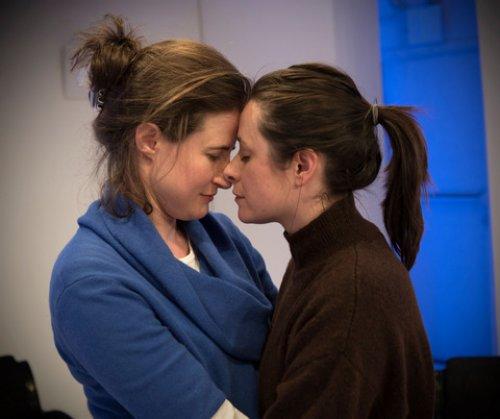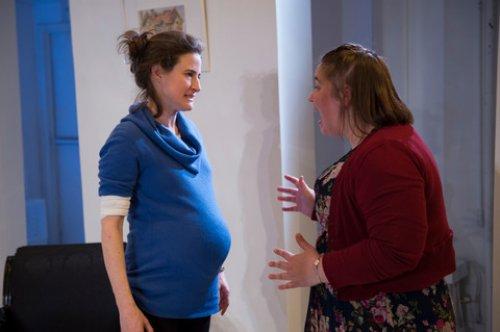Charlie’s Waiting
An eight-year-old child changes these characters’ lives whether they know it or not in this new play by Mêlissa Annis.

Xanthe Elbrick and Stephanie Heitman in a scene from Mêlisa Annis’ “Charlie’s Waiting” (Photo credit: John Quilty)
[avatar user=”Joel Benjamin” size=”96″ align=”left” ] Joel Benjamin, Critic[/avatar]
The never-seen title character of Mêlissa Annis’ play Charlie’s Waiting is an eight- year-old boy whose very existence affects all three of the play’s characters, changing their lives whether they know it or not.
He is the alleged son of Kelly (Stephanie Heitman) who is one day shy of marrying Louise (Xanthe Elbrick) in a countryside wedding in England. Their pre-wedding day is interrupted by a visit by an old friend of Kelly, Annie (Amy Scanlon), the bearer of young Charlie to the sparsely, but tastefully, decorated converted farmhouse owned by the well-to-do Louise. (Simple, but effective scenic and alert costume design by Meganne George.)
A very pregnant Louise is taking firm command of last-minute preparations for her wedding while her fiancée Kelly is off tending to a neighbor’s goats—or is she?
Louise’s obsessive planning is irritatingly interrupted by a totally unexpected visit by Annie. The two conversationally dance about until Annie comes to the point: years ago she was in a relationship with Kelly—whether sexual or not is never revealed—and, in addition, Kelly gave birth to a son who may, or may not have been the product of a rape—or was it a love affair?
All of which gives Louise pause as Annie beats a hasty retreat, leaving poor Charlie ensconced in an automobile just down the road. Annie, the interloper, is so desperate for love and eager to end her forced adoption of little Charlie that she is speeding off to her Albanian lover’s homeland, leaving Louise and Kelly to deal with the consequences.

Xanthe Elbrick and Amy Scanlon in a scene from Mêlisa Annis’ “Charlie’s Waiting” (Photo credit: John Quilty)
These quandaries form the underpinnings of Charlie’s Waiting which seeks to examine issues of trust between a romantic couple and how quickly this trust can be eroded or strengthened, all helped by Annis’ uncanny ability to lay doubt upon doubt to optimal effect with her witty, literate dialogue.
Kelly’s return from her goat tending begins a twisty conversation between her and the perplexed and disturbed Louise, revealing both the cracks and the bulwark of their complex relationship leading to a touching, love-affirming slow dance—choreographed with astuteness by Margaret Bellusci—that leads to a romantic kiss interrupted by an unforeseen knock at the door.
Miriam Nilofa Crowe’s lighting gives dimension to the tiny TheaterLab space in addition to alluding to the passage of time.

Stephanie Heitman and Xanthe Elbrick in a scene from Mêlisa Annis’ “Charlie’s Waiting” (Photo credit: John Quilty)
Billed as a “dark comedy,” Charlie’s Waiting does have a thin veneer of humor with darker emotions whirling about beneath the surface. Several plot points seem improbable. Would on-the-ball Louise actually leave the preparations for the high point of her marriage ceremony, the release of floating Chinese lanterns, to the last minute as portrayed in the play? Is Louise so self-involved that she would leave the poor child out in the cold?
Ludovica Villar-Hauser, the play’s keen eyed and eared director (and artistic director of Parity Productions the company responsible for this presentation), paces the fine actors for the ultimate tension, making the most of every innuendo.
All three actors portray their characters with subtlety, their eyes revealing as much as their voices, carefully avoiding sliding into what might have been melodrama.
Charlie’s Waiting (through April 20, 2019)
TheaterLab, 357 West 36th Street, in Manhattan
For tickets, visit http://bit.ly/2RXpMUq
Running time: 75 minutes without an intermission






Leave a comment